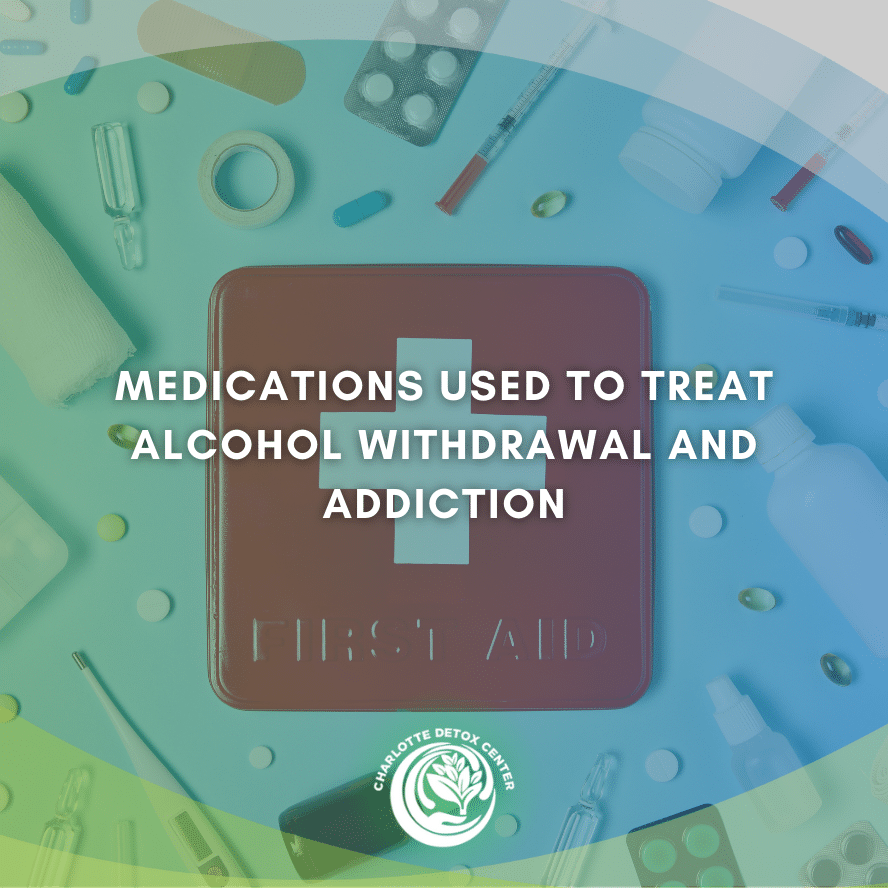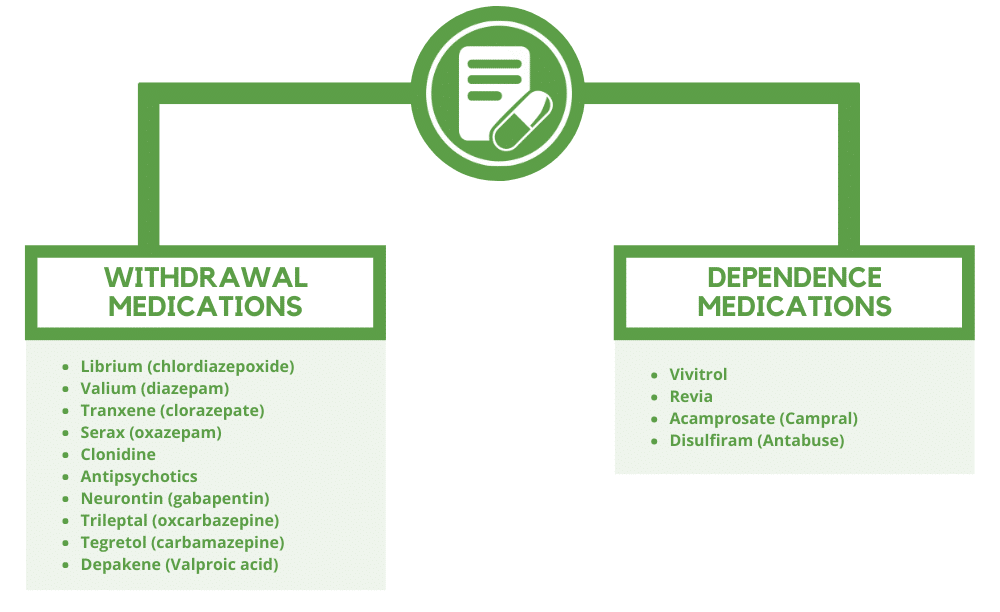Medications Used to Treat Alcohol Withdrawal and Addiction

Medically Verified: 2/1/24
Medical Reviewer
Chief Editor

All of the information on this page has been reviewed and verified by a certified addiction professional.
Alcohol use disorder is a chronic condition that affects between 7-8% of Americans at any given time.[1] Alcohol abuse is also thought to have increased over the last year and is one of the leading causes of preventable death. The traditional treatment approach for alcohol withdrawal and addiction involved supportive care, barbiturate medications, and psychotherapy. However, advances in medicine and addiction treatment programs have produced a variety of different solutions for the treatment of alcohol abuse and dependence.
The first step of alcohol recovery is detox. Detox can be extremely uncomfortable and even life-threatening without medical treatment. Today, detox centers in Charlotte take advantage of different medications to treat alcohol withdrawal and addiction.
Side Effects and Complications of Alcohol Withdrawal
People who develop a dependence on alcohol may begin having withdrawal symptoms in as little as 6-8 hours after they stop drinking. Depending on the severity of their alcohol abuse and other individual factors, symptoms can range from mild to severe and can last for up to two weeks.
Common symptoms of alcohol withdrawal include:
- Depression and anxiety
- Mood swings
- Nausea or vomiting
- Diarrhea
- Sweating
- Increased heart rate
- High blood pressure
- Tremors
- Agitation
- Anxiety
- Seizures
In extremely severe cases of alcohol dependence and withdrawal, people may develop a neurological condition called delirium tremens (DTs). DTs are characterized by an over-excited nervous system and mental changes like hallucinations, confusion, and paranoia.
Without treatment and monitoring, alcohol withdrawal symptoms can be deadly. Attempting to quit drinking without medical care is dangerous and never recommended. Alcohol detox centers in Charlotte can provide life-saving intervention, medication, and therapeutic services.
Alcohol Withdrawal Medications
When patients first arrive at an alcohol detox center in Charlotte, they will undergo an evaluation with a doctor who may prescribe any of the following medications depending on the person’s symptoms and health conditions.

Benzodiazepines
Benzodiazepines are regularly prescribed to treat anxiety, panic, and some seizures. They are the first medication doctors often turn to for alcohol withdrawal because alcohol and benzodiazepines can produce a cross-dependence. As a result, these medications are highly effective at treating many symptoms of withdrawal, including seizures.
Benzodiazepines that are approved by the FDA to treat alcohol withdrawal include:[2]
- Librium (chlordiazepoxide)
- Valium (diazepam)
- Tranxene (clorazepate)
- Serax (oxazepam)
Clonidine and Other Beta-Blockers
Beta-blockers, such as clonidine, are prescribed to treat conditions like hypertension (high blood pressure) and high body temperature. They may be used to help control these symptoms as well as physical symptoms of anxiety in people who are detoxing from alcohol.[3]
Antipsychotics
Antipsychotics may be prescribed to patients who experience delirium tremens (DTs) or extreme agitation during alcohol withdrawal. Doctors may be hesitant to prescribe antipsychotics because they may make patients more susceptible to seizures.
Anticonvulsants
Anticonvulsants may be prescribed in addition to or alongside benzodiazepine medications during alcohol withdrawal. These include:
- Neurontin (gabapentin)
- Trileptal (oxcarbazepine)
- Tegretol (carbamazepine)
- Depakene (Valproic acid)
Alcohol Dependence Medications
While many of the above-listed medications are usually discontinued after acute alcohol withdrawal is over, there are additional treatment medications that may be prescribed for the continued treatment of alcohol dependence. These medications, however, are most effective when combined with a comprehensive treatment program for alcohol addiction.
Naltrexone Oral or Vivitrol
Naltrexone is a medication that blocks the effects of opioid drugs, however, it is also approved by the FDA to treat alcohol dependence. Studies have found that naltrexone helps decrease alcohol cravings by reducing the feeling of reward or pleasure associated with drinking.[1]
Naltrexone is available as an oral tablet and is also sold under the brand name, Revia. It is also formulated into an extended-release injection that is given once per month, sold under the name Vivitrol. Patients must detox from alcohol completely before starting treatment with naltrexone.
Acamprosate (Campral)
Acamprosate (Campral) is thought to help balance chemicals in the brain and restore normal functioning. In combination with therapy and social support, this is thought to help patients reduce their drinking behaviors.
Disulfiram (Antabuse)
Disulfiram is a medication that inhibits the enzyme the body needs to metabolize alcohol. When patients take Disulfiram (Antabuse) while drinking alcohol, they may experience unpleasant symptoms like sweating, blurred vision, vomiting, and nausea. These effects are thought to discourage individuals from drinking and help patients associate drinking with getting sick. By creating an aversion to alcohol, Antabuse can help some patients prevent relapse.[4]
Start Your Alcohol Detox in Charlotte, North Carolina Today
Here at Charlotte Detox Center, our job is to keep you safe during detox. We do this by prescribing the medications you need to get through alcohol withdrawal safely and comfortably. We also provide around-the-clock supervision, facilitate peer support groups, and have on-site medical staff for a full-service treatment program. You don’t have to struggle with your drinking any longer. Contact us today to find a detox program near you.
References:
